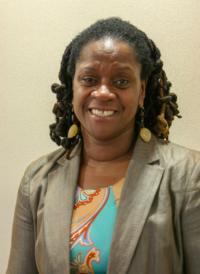Black members have played a powerful part in the success of the NASUWT’s work on racial equality.
Jennifer Moses started working for the Union in 1998 and has served as the National Official for Equality and Training for 15 years.
She says that the launch of our consultation conferences for under-represented groups in 2003 was a key development.
The Black Teachers’ Consultation Conference has given members an opportunity to inform and influence the NASUWT’s policies and practices.

Jennifer Moses
“The first conference involved about ten members taking part in a roundtable discussion. This year, nearly 500 members attended.
“The conference is now the largest gathering of Black teachers in Europe.”
Find out more about future Black Teachers’ Consultation Conferences.
For anyone interested in taking part, Jennifer says: “First and foremost, this is a safe space for someone who identifies as Black.
“They are able to share their experiences confidently and confidentially with like-minded people from similar backgrounds and experiences.
“Black members can discuss how they got over any barriers of race discrimination and inequality in their workplaces.
“It is also a great opportunity for them to network, and find out how to get more involved and have a voice within the Union.
“Our commitment to ensure that our membership is diverse and representative of the workforce is very important to the NASUWT.”
The Union also holds consultation conferences for members who are women, disabled, LGBTI and young teachers.
Jennifer is keen to highlight that there is a strong recognition of “intersectionality”, exploring how members may be affected by multiple types of discrimination.
Shortly after these conferences, any members interested in becoming more active within the Union are invited to attend a development course.
These one-day workshops offer an introduction to the NASUWT’s work, the various posts and offices available, how to apply for them, and sources of support.
Jennifer says that the Black Teachers’ Consultation Conferences and the Black Development Courses have led to tangible progress.
“Our Black members have got more involved, managed to take on roles at a local level and develop motions on important issues of race inequality,” she says.
“The number of Black members taking up senior positions, such as negotiating secretaries, has also increased.
“We now take a full delegation to speak at the TUC’s Black Workers’ Conference every year and currently have two representatives on its Race Relations committee.”
The NASUWT has published advice on how Local Associations can ensure that their meetings are fully inclusive and how to attract more Black members, and other under-represented groups, to get involved in the Union.
“Local Association Meetings – Good Practice Tips” suggests how to improve access in terms of planning, communication, the agenda, timing and venues.
Jennifer believes that with the disproportionate impact of Covid-19 on Black people, it is now more important than ever for them to become active within the Union.
The NASUWT has been constantly campaigning for UK Governments to meet their racial equality obligations in their plans for the reopening of schools.
We are also supporting many Black members working for employers who are failing to follow the guidance on risk assessments and safety measures.
“Once again, the voices and experiences of Black teachers are being marginalised,” says Jennifer.
“That is why, once again, it is the task of our Union to shine a light on these issues, campaign for better government guidance and support any members at risk.”
Our Black Advisory Committee offers another opportunity to get involved in the NASUWT’s work on racial equality.
Nominations are made through our Local Associations. Seven members serve on the committee each year, and if more people apply then an election is held.
Jennifer says: “We often need to hold an election, which demonstrates that there is an appetite out there for our Black members to be more active within the Union.
“We consult with committee members about which issues the Union should focus on, what their experiences are, and how to improve our equalities work.
“Their comments and concerns go straight through to our Equal Opportunities Committee, which is a standing committee of the National Executive.
“Through this process, the committee members have a direct voice to the leadership of the NASUWT.”
Nationally, the Union is at the forefront of tackling racial inequality.
We launched the Act for Racial Justice campaign in 2016 to challenge all forms of race discrimination, injustice and inequality for Black teachers and pupils.
To support this, the NASUWT and the Runnymede Trust produced an influential publication called “Visible Minorities, Invisible Teachers”.
This research revealed both the overt and covert ways that Black teachers experience racism and discrimination in their everyday working lives.
The report highlighted how pervasive and persistent racism is within the British education system, affecting Black teachers’ morale and long-term career aspirations.
Of course, the NASUWT has to lead by example and ensure that our own organisation offers equal opportunities to our Black activists and Black staff.
In this respect, 2020 has been a milestone year.
Michelle Codrington-Rogers became the NASUWT’s first black National President and Dr Patrick Roach was appointed as our first black General Secretary.
Dr Roach is currently the only black General Secretary of a TUC-affiliated union and he has recently been appointed as the chair of the TUC’s new antiracism task force.
This task force will take forward a wide-ranging programme of action to tackle racial discrimination and ensure fairness and decent treatment for all workers.
Jennifer feels that these recent achievements have “lifted the spirits and hopes” of our Black members.
“I think the NASUWT’s equalities work has progressed in leaps and bounds,” she says.
“We are now seen, not just nationally but internationally, as one of the leading unions in tackling inequality - right across the board, not just in terms of race.
“This success is due to the Black members on the ground. They are helping to lead the NASUWT into the future by their involvement and their activity.
“They should be commended and congratulated for all the work they do in helping our Union to grow and succeed.”
The NASUWT is raising awareness about the achievements of our Black members - both as teachers and activists - as part of our celebrations for Black History Month.

